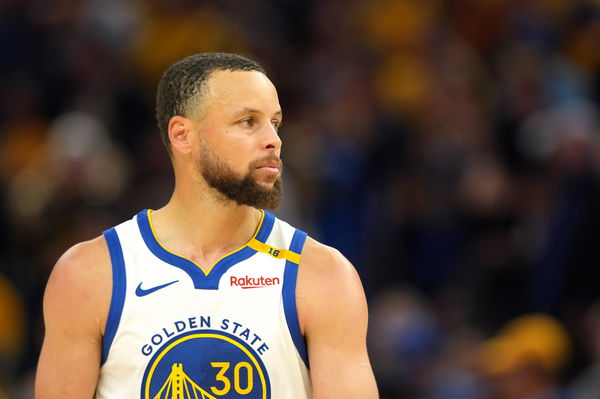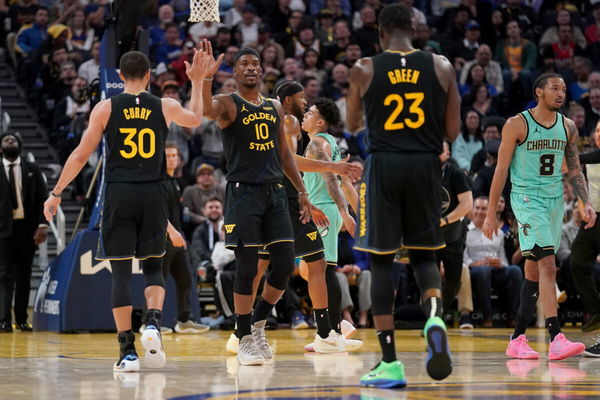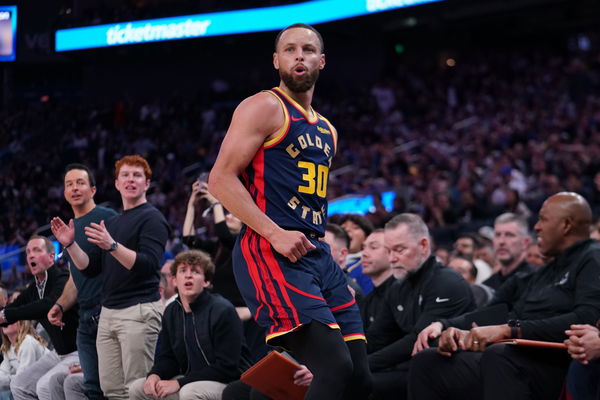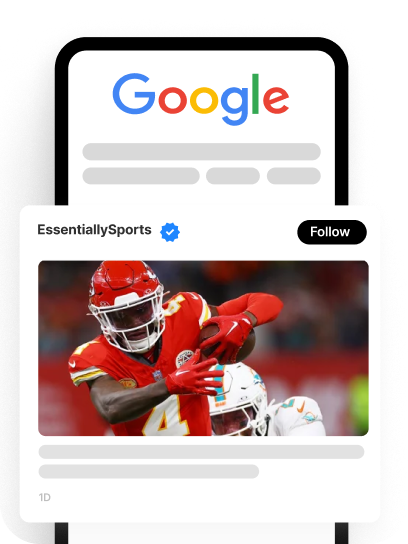
Imago
Stephen Curry – Bruce Fraser (Exclusive)

Imago
Stephen Curry – Bruce Fraser (Exclusive)
Technically, the Golden State Warriors held an optional practice considered voluntary for any player to attend. In reality, young and rotation players have to report, while the stars and veteran players can rest.
Watch What’s Trending Now!
It makes sense the Warriors would hold such a practice during training camp and in Los Angeles following a recent exhibition game against the Lakers. Stephen Curry didn’t observe the custom despite missing Sunday’s exhibition for maintenance purposes. Instead, the Warriors’ 37-year-old star reported to this so-called optional practice at USC’s Galen Center well before it even started.
“I just watched Steph in there,” Warriors coach Steve Kerr said, shaking his head while standing outside of the practice gym. “He took about an hour before he got even on the court to start his shooting routine that he’s doing now. And in that hour, he was stretching, and he was getting treatment. He was doing strengthening exercises. This is every day. It’s really impressive watching the amount of thought and preparation that goes into it for Steph.”
The preparation continued after Kerr talked to reporters.
Inside, Curry continued an individual workout with Warriors assistant coach Bruce Fraser that consisted of both shooting drills and resistance band exercises. About a half-hour later, Stephen Curry spoke with EssentiallySports about his training regimen that he hopes will ensure that he can play at an elite level both in the 2025-26 season and possibly even into his 40s.
“All I’ll say is that I just want the option and if I’m at a legitimate ability to be able to play,” Curry told EssentiallySports. “I don’t know if it’ll make sense or if I would want to, whatever the case is. But if I can make the decision and the decision is not made for me, that’s a big, big point.”
Curry has time to determine his future. Curry remains under contract with the Warriors through the 2026-27 season. Both sides have also often said over the years that it remains a priority for Curry to play his entire NBA career with the Warriors.
In the short term, Curry will have clarity throughout the 2025-26 season on how well he can play at an All-Star caliber level and stay healthy. The Warriors are considered dark-horse candidates to contend for an NBA championship, mostly because of Curry. But other factors could either widen or shorten their championship window.

Imago
Apr 26, 2025; San Francisco, California, USA; Golden State Warriors guard Stephen Curry (30) during the fourth quarter of game three of first round for the 2024 NBA Playoffs against the Houston Rockets at Chase Center. Mandatory Credit: Darren Yamashita-Imagn Images
The Warriors still have one of the NBA’s best defenders, who also spent his entire career with them (Draymond Green). They have a proven All-Star who made an instant impact after last season’s trade deadline (Jimmy Butler). They added a valued veteran known for his locker room leadership and winning habits (Al Horford) and another strong shooter who has family ties (Seth Curry). Lastly, the Warriors expect their fifth-year forward (Jonathan Kuminga) and third-year guard (Brandin Podziemski) to be prepared for bigger roles.
How will those ingredients mix? Some of that depends on whether Kuminga and Podziemski can excel more consistently. It also depends on whether Horford (39), Stephen Curry (37), Butler (36), Green (35), and Seth Curry (35) can avoid major injuries.
“There’s only so much you can control. But we’ve got a really good understanding of what it takes to get through an 82-game season,” Curry told EssentiallySports. “We have some youth that can carry us. Hopefully, we can have a good complement of age and wisdom and youth and energy. But I know with me, Jimmy and Draymond, we all understand the work that goes in behind the scenes with recovery and all that type of stuff. If you want to win a championship, health is a big part of it. Every team that gets to the finish line has health on their side. So you cross your fingers and hope you can get it done.”
Curry mostly got it done last season with his scoring (24.5 points per game), his shooting from the field (44.8%) and from deep (39.7%), as well as his playmaking (6.0 assists) in 70 regular-season games. After acquiring Butler from the Miami Heat before the trade deadline, the Warriors snuck into the playoffs through the Play-In tournament as a seventh seed. The Warriors also went 27-8 in games that Curry and Butler played together, a development that gives the franchise relative optimism on how well they can thrive with a full season together.
Though Curry averaged 22.6 points while shooting 47.7% from the field and 40% from 3, along with 5.1 assists in five playoff games, he experienced Father Time’s unforgiving touch. He played through the Rockets’ physical defense in a seven-game first-round series. But after scoring 13 points in 13 minutes against the Minnesota Timberwolves in Game 1 of the Western Conference semifinals, Curry left with 8:19 left in the second quarter and did not return because of a Grade 1 left hamstring strain. He then missed the Warriors’ final four playoff games.
Curry’s trainer, Brandon Payne, told me recently that he spent plenty of his offseason devoted toward both strength training and speeding up his decision making in hopes to maximize his health, preemptively offset any reduced athleticism, and continuously thrive off-the-ball while Butler assumes playmaking duties.
“A lot of it is the foundational work that I’ve put in since I started,” Curry told EssentiallySports. “One, I still love it. I’m blessed with being with a team around me that has helped take the spirit that I’m trying to put into it and give me the framework that keeps the body limber and loose and the injury prevention stuff. The rest of it is a toughness to get out there and do the work. I still love and want to keep it going.”
The Warriors anticipate they won’t need to rely on Curry as much as last season. That’s because the Warriors will have Butler for a full season. They also anticipate they will have firmer playoff positioning than they did last season following the trade deadline. After the Warriors acquired Butler, they sat in 11th place in the Western Conference.

Imago
Feb 25, 2025; San Francisco, California, USA; Golden State Warriors forward Jimmy Butler III (10) is congratulated by guard Stephen Curry (30) after a basket against the Charlotte Hornets in the third quarter at the Chase Center. Mandatory Credit: Cary Edmondson-Imagn Images
“Ideally, we’re not chasing a playoff spot for the last 30 games like we were last year,” Kerr said. “That’s easier said than done when you look at the West. We’d like to be in a better position down the stretch so that we aren’t chasing things and exposing guys. But to be honest, you can do everything perfectly, and it might not matter.”
That explains Curry’s admission that his extensive off-season work does not guarantee anything. That didn’t dissuade him from trying, though.
“There’s only so much you can control in that respect,” Curry told EssentiallySports. “One, it’s all about rest. Sleep is the easy answer, but it’s the most important. Honestly, it’s also about having a good balance on how to keep your mental health in the right frame of mind, especially in today’s age, where there’s so much noise and distraction around you, whether it’s in season or out of season. When I’m out there on the floor, it doesn’t mean that I have to take a bunch of extra time. But it just means every minute that I’m out there has a purpose and an intention. So it’s about sleep, breathing, work, and getting away from the game when I need to.”
Shortly after discussing his off-season regimen and outlook on his future, Curry went to the trainer’s room for more work before the Warriors left for Portland to play in Tuesday’s exhibition game against the Blazers. In the Warriors’ 118-111 win over the Blazers, Curry posted 28 points while shooting 6-for-15 from the field and 4-for-11 from deep, along with six rebounds, five assists, and five turnovers in 27 minutes.
The following day, EssentiallySports spoke with Fraser for a more in-depth discussion about Curry’s training, his longevity, and his upcoming season.
Editor’s note: The following one-on-one conversation has been edited and condensed.
When I went to your practice at USC, I was fascinated that it was an optional practice, but that Steph’s still there. He’s doing a bunch of shooting work and resistance work with you. What else did he do with you on an optional day?
Fraser: (laughs). “Well, I think he knows his body well, and he knows what he needs. He’s gearing up for the season. So this is not uncommon work. It’s one of his strengths, along with his passion for the game. Without being sappy, it’s his passion for the game and his passion for the work. I think that was one of his better workouts that I’ve ever seen.”
Oh, really? How so?
Fraser: “Yeah. It was not based on shooting. For him and his shotmaking, he’s on his own scale. For anyone else, shooting-wise, it probably would have been an A+. For him, it was about a B for his shooting prowess and shooting accuracy. But the impressive part of his workout was the purpose he had to it and the pace that he was going at and the level of difficulty with some of his shots. They weren’t crazy, far shots. But they were off the move. I could tell he was trying to find his energy. Tired is not the right word. But he was trying to find the energy. It wasn’t perfect, from what I’ve seen. But what was impressive or motivating was that he just stayed the course. He persevered through a workout that wasn’t, for him, at his best. I hate to say that because it was a great workout. There were USC players and coaches, and they all complimented it. They all came up to me and said how impressive Steph was. I didn’t want to say, ‘You haven’t seen anything.’ I was impressed, too, and motivated by his desire to be great.
It was an impressive workout. Shooting-wise, it’s still very impressive. You watch Steph Curry shoot at any time. You don’t walk away and say, ‘Wow. No way.’ It doesn’t matter that if it’s a ‘B,’ ‘C’ or whatever grade you want. You’re still going to walk away and say, ‘Wow. What a Steph Curry workout! But it was a ‘double wow’ because of his purpose. He has more to accomplish. That’s what I would say. He has more to accomplish. He’s not done yet.”
What do you think he still has more to accomplish given his resume already?
Fraser: “I would think that Steph wants to win another championship. I’d start with that. That’s pretty clear. Championships are hard to win. But it’d be easy for him to let go of the rope and say, ‘Let’s see what happens in the next couple of years.’ But he’s not going to just ‘see what happens.’”
Steph shared with me that he wants to have the option to play into his 40s. How do you look at that goal?
Fraser: “I think he’ll play until he doesn’t enjoy it anymore and isn’t great. He’s going to play until he’s no longer great. He knows what it takes to be great. He’s saying all of those things to me, ‘I’ll play until I don’t enjoy it or if I’m not great.’ We don’t know when that will come. Both of those things are subjective realities defined by him and not defined by anybody else. Those are goals that he has within himself. He knows what it takes to be great. He knows what provides enjoyment for him. We don’t have any say in that. The world doesn’t have a say in that. That’s what Steph Curry has a say in. So as long as he has a say in it and as long as he’s motivated by those things – greatness and accomplishing more and love of the game – he’s going to work at it like he always has.”
It obviously goes without saying that there is the health part. Sometimes that can be in a player’s control and sometimes not. From your window, what do you see him doing to give him the best shot with injury prevention?
Fraser: “It’s almost what he doesn’t do with me that increases the odds (laughs). Our performance staff with the Warriors is really good with Rick Celebrini and his group. What he’s doing off the court is equally as important with what he’s doing on the court. He works a lot with Kyle Barbour, our strength coach. Steph does a lot with him and does a lot with Rick. Steph’s work on his body and on the physio side of it is as important now. It always has been. He’s always taken care of his body.
His skillset is elite. He’s the best shooter in the world. You go through the list of things we know he’s good at. We can improve those things. We’re trying to improve those things, and we’re continuing to work. But I would say his mind is at a place where he’s confident in all things and is purposeful about his work both on and off the court. The most important thing, honestly, is his health and how he maintains that. That’s not a skill level, but his health determines how his body feels. That helps in his performance.

Imago
Apr 4, 2025; San Francisco, California, USA; Golden State Warriors guard Stephen Curry (30) hits a clutch three pointer against the Denver Nuggets in the third period at Chase Center. Mandatory Credit: David Gonzales-Imagn Images
This may be a part of it or not, but I think last year we had to fight so hard down the stretch in the last month of the season just to get into the playoffs. I think that taxed him. We were in a chase for a playoff spot. That, combined with a very physical season and series vs Houston in seven games straight to Minnesota with no rest? I think for all of our guys, that was tough. I don’t want to say, because I’m not an expert, on whether that was related to his [hamstring] injury. But his body was definitely worn down.”
How did you see Steph manage the different stages in the playoffs with the physicality against Houston and then having his hamstring injury in Game 1 against Minnesota and then having to sit out the last four playoff games?
Fraser: “I thought he was impressive in that Houston series based on some of the way some of the guys were guarding him and the physicality of the series. He still had an ability, even with that level of length on him and level of physicality on him. He still was able to persevere through that. Every team keys on him. Houston wasn’t any different, but they had a lot of good defenders that keyed on him. They were switching him up a little bit. I was impressed that he was able to endure that physically and mentally stay focused. He wasn’t great every game. But in the big games, he was great.”
I know he’s made improvements on this in recent seasons, so this isn’t new. But does he look stronger to you in this camp than even before?
Fraser: “I don’t know. I wouldn’t say he’s stronger. But he keeps himself in very good shape. So he’s certainly ready for this season. You can tell. You can feel it. He worked this summer. He always does. He puts himself in a good position to start the season.”
What do you think his added strength, though, in the past few years has done for Steph to manage the workload, the double teams, and physicality from various opponents?
Fraser: “It’s critical that he’s strong. There is a balance between strength and mobility. He can’t be the strongest guy in the gym and still be able to be mobile like he is and shoot with the feathery touch that he has. There is a balance to me in what he’s dealing with, and he’s figured that balance out perfectly. He can still add strength, or at least maintain strength. He adds strength in the summer. He maintains strength during the season. And he still remains highly skilled.”
The Jimmy trade made an obvious immediate impact. Why did Steph and Jimmy complement each other so well with both their games and leadership styles?
Fraser: “They’re both winners. That may sound generic. But they’re both winners. They’re both high-skilled players. Jimmy brings a different skillset, size, and strength that are different than Steph. But both are very smart. Jimmy’s IQ and skill added a lot to what we needed. They complement each other well because both of them are smart. So they can play off of each other. Jimmy is an elite passer and an elite playmaker. He’s elite at other things. But relative to helping Steph, he’s really good at getting guys shots, especially Steph. He’s really good at managing the game. Jimmy is not just a skilled player. He’s a strategist and a manager of high-level games. The ball is in his hands a lot for a reason. He’s that good. That helps Steph.”
Steph never shied away from taking heaves at the end of quarters. But what do you think of the new rule that the league won’t count the percentage of those shots?
Fraser: “Steph’s percentages will go up (laughs). That’s how I look at it. Think about what his percentage would be if you took away all of those shots. I don’t know what it would be. But there’s at least three during a game and sometimes four. I don’t want to say ‘at least.’ But there’s at least an opportunity for that in every game. Let’s just say he takes one a game out of the four opportunities. That could be 80 misses. Obviously, he makes a couple of them. But take off 78 misses. So I would say his percentage will go up in a funny way.”
It’s hard to say that many made end-of-quarter heaves affected the outcome. But when those shots went in, what impact did that have on the group for the rest of the game?
Fraser: “They are deflating for the opponent. Many times, it gives your team a little momentum and a little boost. I can’t remember exact games. But I’ve seen him hit game-winners. I’ve seen him hit big shots at the end of quarters. I don’t want to overdramatize it and say those things are everything. They’re not everything. But those are small things that add momentum in a game or take away momentum from another team. They’re valuable, but not critical. They can sway momentum. But I wouldn’t say his heroics at the end of buzzer shots, unless it’s a game-winner, are a recipe for success.”
Steph cracked the 50-40-90 club during his MVP season (2015-16). He’s come close in other seasons. What’s your outlook on Steph getting it again knowing how great of a shooter he is, but that the margin of error is so slim?
Fraser: “I think it’s an important marker for him because he knows it’s difficult. It’s a report card on accuracy and shot excellence. It’s not the end-all. But it is a report card for him to say, ‘This is where you landed.’ It’s another thing for him to subtly chase.”
What’s your outlook on Steph’s MVP chances compared to the rest of the field?
Fraser: “He always has a chance for that. That’s based a little bit on the team, the success of the team and also his own play. Does he have a chance always at it? Yes, I think so. But there are a lot of great players now. There always have been. So I think there are many factors that go into that, and not just how good Steph is. He’s always in the conversation. It’s going to be about win-loss, success of the team, and numbers for him. How do his numbers compare to some of the others? But I think it has a lot to do with the success of the team.”
